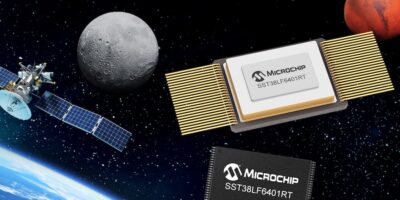Microchip adds 64Mbit parallel SuperFlash to rad-tolerant COTS devices
To reduce the time, cost and risk of developing space flight-qualified systems, designers can replace commercial-off-the-shelf (COTS) devices with space-qualified, radiation-tolerant equivalent parts available in plastic or ceramic packages with the same pinout distribution. Microchip Technology has announced a radiation-tolerant, 64Mbit parallel-interface SuperFlash memory with total ionising dose (TID) tolerance for reliable, robust operation in the harsh radiation environment of space missions. It can be used with Microchip’s space-ready microcontrollers, microprocessors and FPGAs that provide the building blocks for this scalable development model.
“The SST38LF6401RT SuperFlash memory offers the vital protection these space systems need for the most reliable digital processing where companion Flash memory is required to store the critical software code or bitstream that drives the complete system,” said Bob Vampola, associate vice president of Microchip’s aerospace and defence business unit.
Radiation-tolerant up to 50 kilorad (krad) TID, even while the flash is still biased and operating, the SST38LF6401RT enables systems to operate in a broad range of space applications where they cannot afford any loss of code execution that could lead to severe defects and system loss. It can be used with Microchip’s SAMRH71 Arm Cortex-M7-based radiation-hardened SoC processor and can also be used with its RT PolarFire FPGAs to support in-flight system reconfiguration. The device has pinout distribution compatibility with its industrial version for easy transition to the space-qualified plastic or ceramic versions at the PCB level. Voltage operation of the SST38LF6401RT ranges from 3.0 to 3.6V.
The SST38LF6401RT SuperFlash is sampling now in a ceramic version and supported by an evaluation board and demonstration software, available upon request. Microchip also offers an FPGA flight programming reference case for combining the SuperFlash device with an FPGA and a SAMRH71 processor with supporting software.
Microchip selects relevant devices from its automotive- or industrial-qualified products and adds silicon process improvements to protect and make them more immune to single-event latch-up in heavy ion environments. The radiation performance of the slightly modified devices is fully characterised and supported by a dedicated radiation report for each functional block. The devices are used in applications ranging from launch vehicles and satellite constellations to space stations. Designers can begin system implementation with easy-to-source COTS devices before swapping them out with pinout-compatible space-qualified equivalents in high-reliability plastic or ceramic packages, says Microchip.
Microchip Technology provides smart, connected and secure embedded control products and development tools and products which reduce risk while lowering total system cost and time to market. The company’s customers operate in the industrial, automotive, consumer, aerospace and defence, communications and computing markets.




